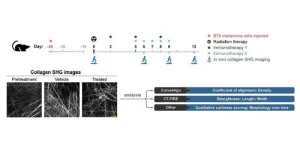Expert interviews Experts from Penn Medicine are available to comment on a wide range of cancer research and care topics before, during, and after the meeting by video call, phone, or email. To arrange interviews, please contact Meagan Raeke at Meagan.Raeke@pennmedicine.upenn.edu or 267-693-6224.
ASCO leaders from Penn Medicine Lynn M. Schuchter, MD, FASCO, the Madlyn and Leonard Abramson Professor of Clinical Oncology and director of the Tara Miller Melanoma Center, is the 2023-2024 ASCO President, and the ASCO Annual Meeting program features more than 200 sessions complementing her Presidential Theme: The Art and Science of Cancer Care: From Comfort to Cure. Schuchter’s experiences treating patients over a three-decade career at Penn informed the development of her patient-centered theme for the meeting.
In addition, Angela DeMichele, MD, MSCE, FASCO, the Mariann T. and Robert J. MacDonald Professor in Breast Cancer Research, is the chair of the Scientific Program Committee; Charu Aggarwal, MD, MPH, FASCO, the Leslye M. Heisler Associate Professor for Lung Cancer Excellence, is the chair of the Cancer Communications Committee and an incoming elected member of the Nominating Committee; and Neha Vapiwala, MD, FASCO, a professor of Radiation Oncology, is an elected member of the Nominating Committee.
Related News Check back for additional news releases during the meeting.
Key Presentations Penn researchers will present results from clinical trials, including a national cooperative group study for esophageal cancer, a Phase I study using a new CAR T cell therapy for re-treatment in patients with lymphoma, and a multicenter study of a combination therapy for ovarian cancer. They will also present results from several studies that show how AI is being applied to cancer care.
Treatment clinical trials
Phase II study of combination therapy for recurrent ovarian cancer (Abstract 5510). Currently, no treatment alternatives to chemotherapy exist for ovarian cancer that returns after standard platinum chemotherapy. According to the Ovarian Cancer Research Alliance, around 70 percent of patients diagnosed with ovarian cancer will have a recurrence. This investigator-initiated multi-center clinical trial, led by Fiona Simpkins, MD, the Hilarie L. and Mitchell L. Morgan President's Distinguished Professor in Women's Health, assessed a new strategy combining two different targeted therapies—an ATR inhibitor and a PARP inhibitor—for patients with recurrent ovarian cancer. The combination therapy was safe, and nearly half of the patients saw some tumor shrinkage, with an overall response rate of 48.5 percent and median progression-free survival of 8.3 months. Simpkins will present the findings in a Clinical Science Symposium on Saturday, June 1 at 1:15 p.m. CT in Room E451.
Phase I first-in-human study using armored CAR T for lymphoma (Abstract 7004). While CAR T cell therapy has revolutionized treatment for many blood cancers, most patients who receive an FDA-approved CAR T cell therapy product do not experience a long-term remission. Those who relapse after CAR T cell therapy tend to have a poor prognosis. This Phase I study, led by Jakub Svoboda, MD, an associate professor of Hematology-Oncology, aims to find a new treatment option for these patients. The study tested a new armored CAR T, developed by Carl June, MD, the Richard W. Vague Professor in Immunotherapy, that secretes interleukin 18 (IL 18) in addition to targeting CD19. The new CAR T cell therapy was safe, with a three-month overall response rate of 80 percent in 20 patients with non-Hodgkin lymphoma (NHL) whose cancers relapsed or did not respond after receiving a commercially available CAR T cell therapy. Some of the earliest patients treated have now been in remission for two years or more. Svoboda will present the research in an Oral Abstract Session on Saturday, June 1 at 3 p.m. CT in S100bc.
Phase II/III ECOG-ACRIN study of pre-surgery immunotherapy for esophageal cancer (Abstract 4000). The current standard of care treatment for patients with localized esophageal and gastroesophageal junction cancer is chemotherapy and radiation before surgery. Since immunotherapy has proved beneficial for patients with advanced disease, this study assessed whether adding immunotherapy to chemotherapy and radiation could improve pathologic complete response (pCR) at surgery for patients with less-advanced esophageal cancer. This Phase II/III ECOG-ACRIN study (EA2174), led by Jennifer R. Eads, MD, physician lead for GI Clinical Research and an associate professor of Hematology-Oncology, found that adding immunotherapy did not help eradicate the tumors, with a pCR rate of 21 percent in the group who did not receive immunotherapy, compared to 24.8 percent in the group who did, a difference that was not statistically significant. The results could help inform future clinical trial design for this patient population. Eads will present the study results in an Oral Abstract Session on Tuesday, June 4 at 9:45 a.m. CT in Hall D1. AI in cancer care
Deep learning CT-imaging based biomarker to predict immunotherapy response in lung cancer (Abstract 102). One of the challenges to determining whether someone with non-small cell lung cancer (NSCLC) will benefit from immunotherapy is that a tissue biopsy is required to determine the PD-L1 status, the most common—yet still imperfect—biomarker of response. In this study, Ravi Parikh, MD, an assistant professor of Medicine and Health Policy, and colleagues, used a deep-learning model to develop a biomarker based on data from patient CT scans, which are widely used and more readily available than tissue biopsies. The team trained the model on nearly 20,000 patient scans from nine different institutions and validated it in two different datasets: one including more than 450 scans from patients treated at 10 different institutions, representing ‘real world’ data, and a smaller data set from a Phase I clinical trial. The model was accurately able to predict “high responders” with a three times greater likelihood of progression-free survival than those the model identified as “low responders,” independent of PD-L1 status. Parikh will present the findings in a Clinical Science Symposium on Saturday, June 1 at 8 a.m. CT in Hall D1.
BE-a-PAL: A randomized trial of algorithm-based default palliative care referral among patients with advanced cancer (Abstract 12002). Previous work also led by Parikh has shown that machine-learning triggered ‘nudges’ to prompt advanced care planning conversations can improve end-of-life care for patients with cancer. Building off that research, this study used an algorithm to identify patients with certain stage 3 or 4 cancers who could benefit from a palliative care consultation at 15 outpatient clinics in a large community oncology network. In the intervention arm, a palliative care consultation was automatically initiated via the electronic medical record. The intervention arm resulted in more than triple the number of palliative care consultations and less than half the rates of end-of-life chemotherapy—which is universally recognized as low-quality care—compared to the control arm. Parikh will present the findings in an Oral Abstract Session on Sunday, June 2 at 8 a.m. CT in Room S100a.
National implementation of an AI-based virtual dietitian for patients with cancer (Abstract 1500). Penn medical student Keshav Goel, who is interning with personalized nutrition technology company, Savor Health, shares results from the company’s rollout of an AI-based virtual dietitian for patients with cancer. Research shows that many cancer patients who seek nutrition support do not receive it. This virtual platform was designed to address those needs and implemented nationally with 25 cancer advocacy organizations. More than 3,300 users registered for the platform, with 94 percent satisfaction, 84 percent reporting actively using the nutrition advice to guide their diets, 82 percent reporting improved quality of life, and among those with high symptom burden, 88 percent feeling that the platform helped them manage their symptoms. Goel will present the research in an Oral Abstract Session on Tuesday, June 4 at 9:45 a.m. CT in Room S100bc.
###
Penn Medicine is one of the world’s leading academic medical centers, dedicated to the related missions of medical education, biomedical research, excellence in patient care, and community service. The organization consists of the University of Pennsylvania Health System and Penn’s Raymond and Ruth Perelman School of Medicine, founded in 1765 as the nation’s first medical school.
The Perelman School of Medicine is consistently among the nation's top recipients of funding from the National Institutes of Health, with $550 million awarded in the 2022 fiscal year. Home to a proud history of “firsts” in medicine, Penn Medicine teams have pioneered discoveries and innovations that have shaped modern medicine, including recent breakthroughs such as CAR T cell therapy for cancer and the mRNA technology used in COVID-19 vaccines.
The University of Pennsylvania Health System’s patient care facilities stretch from the Susquehanna River in Pennsylvania to the New Jersey shore. These include the Hospital of the University of Pennsylvania, Penn Presbyterian Medical Center, Chester County Hospital, Lancaster General Health, Penn Medicine Princeton Health, and Pennsylvania Hospital—the nation’s first hospital, founded in 1751. Additional facilities and enterprises include Good Shepherd Penn Partners, Penn Medicine at Home, Lancaster Behavioral Health Hospital, and Princeton House Behavioral Health, among others.
Penn Medicine is an $11.1 billion enterprise powered by more than 49,000 talented faculty and staff.
END




